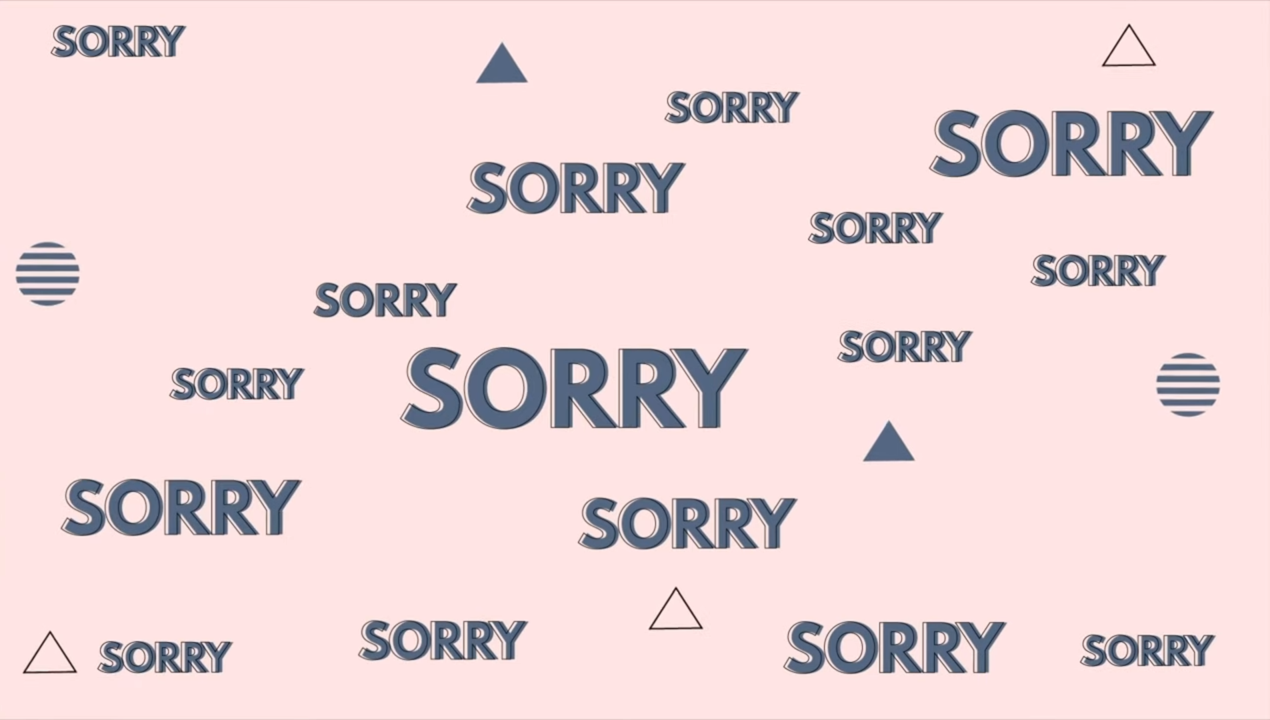by Allison Lee

In recent years, Mattel has caught up with the online content trend and created a series of animated vlogs featuring Barbie herself. I happened to stumble upon one of those vlogs where Barbie talks about “the sorry reflex”. I was quite caught off guard by the fact that this matter of topic influences almost each one of us, yet nobody discusses it.
The sorry reflex is our tendency to apologize for every little thing, even when it’s not our fault, when it’s an uncontrollable situation, or when we don’t genuinely mean it.
Barbie went on to explain that while it’s important to be kind and polite and to apologize for our wrongdoings, apologizing serially when it’s not appropriate is a learned reflex that chips away at our self-confidence. When we reflexively apologize, we automatically assume the responsibility for something that might not be our fault to begin with, something as insignificant as someone bumping into us on the street.
This reflex has manifested into a phenomenon because we all have a different threshold for what constitutes as offensive behavior that warrants an apology. While that threshold varies from person to person and can be affected by factors such as culture, age, and gender, it is considerably lower in one particular group—women.
One theory that explains why women exhibit higher impulses to apologize is that this reflex is more learned than innate. Since a young age, girls are more often than not taught that anything that inconveniences somebody else is our fault, and it is our moral obligation to apologize immediately and remedy our wrongs.
From my viewpoint, I think this has to do with the restrictions we impose on women and young girls; we tell them to talk softly and courteously, what they can or cannot wear, what they are suited to do or not do, and we also teach them to make as little mistakes as possible. Women are associated with the concepts of ‘peacemakers’, ‘polite’, and ‘agreeable’—qualities the sum of which makes women less assertive and more apologetic. Granted, many of these restrictions have been loosened up through the ticking of time as more of us fight for gender equality, but with these concepts drilled into women’s minds, guilt manifests with ease when they feel they have violated those rules.
This trend can disempower young girls and women alike; over-apologizing will deflate one’s self-worth and imbue guilt once the reflex starts compounding. Sooner or later, the threshold for ‘this is my fault’ will only drop lower and lower until we apologize for everything.
I would also like to note that I’m not insinuating boys and men don’t suffer from this reflex—I believe most of us do—it’s just more commonly observed in the life of a woman and Gen Z, and consequently does more damage to the lives of those two categories.

If you are of the opinion that the sorry reflex isn’t a problem, allow me to supply some real-life examples that you might have experienced first-hand:
- When your order at a restaurant is mistaken, you either stay quiet or go: “Sorry, but could you check the order again?”. The innocent blunder was made by either the kitchen staff or the wait staff, yet we feel compelled to apologize because we’re asking them to do additional work by rechecking, something that is perfectly within their job description.
- When you are elated and get a surge of confidence to speak a little louder or laugh a little brighter, you will suddenly tone down and apologize for being loud and bright, as if self-expression is a violation when performed in the presence of others.
- Even when you’re upset and feeling down in the dumps (this is commonly observed in the Gen Z age group), you say sorry in fear of inconveniencing someone or dragging someone’s mood down with you; when in fact, going through the motions and experiencing sadness isn’t something we should be ashamed of or apologizing for.
- When you ask someone for help, be it with a small task or to discuss something that has been weighing you down, you seem to end the exchange with “Sorry for troubling you”, even when an alternative, more powerful phrase could be equipped here (we’ll get to this in a bit).
There are many more instances where the sorry reflex jumps out, such as when we speak out during a meeting or when we reply to a message late. We are overly afraid of making mistakes and offending people. Why? Having missteps is a part of life that everybody goes through, so how can we stop serially apologizing?
Combatting The Sorry Reflex

The easiest way to reduce your use of ‘sorry’ is to simply be aware of this reflex, but having read through this article, you are already equipped with the necessary information. There are several ways to correct this self-defeating reflex, but we’ll be looking at three in this article:
1. Only Take Responsibility For Your Faults
If somebody bumps into you while walking on the pavement, prevent yourself from instinctively apologizing. You are not in the wrong for taking up public space. The more faults we take on that aren’t ours and the more we apologize for them, the smaller the value of our ‘sorry’s.
By only saying sorry for your misconduct, people will take your apology more seriously and sincerely. Be a decent and polite person by assuming responsibilities you have always been bound to, but never apologize for situations that weren’t in your control.
2. Identify Your Triggers
Come up with a list of scenarios where you find yourself apologizing for. Analyze whether or not those situations actually warranted a ‘sorry’; if not, find alternatives that you could substitute with, be it a sound and calm explanation, or a different phrase.
Adhere to this list and slowly transform the way you reply to incidents and situations. Slowly but surely, you’ll find yourself apologizing way less.
3. Replace ‘Sorry’ With ‘Thank You’
The phrase ‘thank you’ brings with it more power and dynamic than we give it credit for. Instead of infusing guilt in yourself, you would be appreciating the other person, which sounds to me like a win-win substitute.
Rather than ‘Sorry, I’m late’, try ‘Thank you for waiting’. See the difference? The former makes it clear that you are at fault for, perhaps, a traffic jam you had no control over; whereas the latter highlights and compliments the other party’s patience. A little rephrasing goes a long way in maintaining your self-confidence and, perhaps, lighting up somebody else’s day.
Go on out there today and be your best self. Run your errands, meet up with someone. Whatever you do, do not find yourself in a situation consecutively apologizing for the tiniest of mistakes. We may not be able to control the unpredictability and spontaneity of life, but we sure can choose how we respond to them.